As a member of G-UNIT, Lloyd Banks has garnered universal acclaim for his incredible lyricism. And while less outspoken – in the public arena – than Tony Yayo and 50 Cent, Banks erupts like a volcano as soon as he steps behind a microphone. With the release of his latest effort, H.F.M. 2 (The Hunger for More 2), Lloyd Banks’ love of rap is perfectly clear, as well as his inextinguishable desire to reign supreme over his peers.
In the midst of a promotional campaign for H.F.M. 2’s third single, “Start It Up,” Lloyd Banks managed to squeeze some time out of his busy schedule and settle down for an interview with Clayton Perry – reflecting on Nicki Minaj, the evolution of mixtapes, and G-UNIT’s contribution to hip-hop.
AllHipHop.com: A few months ago, you released the second album from what I assume will become the Hunger For More series. Considering the meaning behind the title, at what point did you decide that music was going to be the focus and center of your personal and professional lives?
Lloyd Banks: I’m going to be honest, man. I did not always think I was going to be doing what I’m doing, and I’m probably one of the rare exceptions, especially for rappers. Because if you’re a basketball player, usually you have to come through the ranks: the playground, AAU and beyond. So it takes that kind of determination and dedication. As a rapper, some people get into music along with the times. They change with it. I’ve been doing it since maybe like ten or eleven, just writing down stuff and imagining what it would feel like to be onstage. I have so many different references – [Big Daddy] Kane, EPMD, LL Cool J, Slick Rick. So many different things left an impression on me, and I kind of grew with the time. My father was a big fan of hip-hop, so he got me in it, and artists like Biggie, Mobb Deep and 2Pac really, really made me want to do it. 2Pac was the first artist I ever saw perform. I was like eleven years old.
AllHipHop.com: Since your entry into the rap game was somewhat atypical, I am curious to learn about your development – from an artistic standpoint. At what point did you realize that the music business is just as much about the “music” as it is about the “business”?
Lloyd Banks: You know, in the beginning you’re real vulnerable. You’re just a rapper. You don’t really know too much of the ins and outs of the game. You don’t know anything, really. All you know is you want to deal, because from the outside looking in, that’s the way to get you straight. But it’s not until you get into the situation that things become clear. And I can’t even say you realize it’s a business when the money comes, because you underlook yourself. Meaning, you kind of like praise everything else because you feel like it’s a big system, and that’s the reason why you’re having success. So you kind of think everybody but yourself. Meanwhile, the whole story is struggling with the talent that comes from within and it’s something that you had. It’s somebody’s job to discover you. We were more secure, because we came in with 50 [Cent], and that’s a childhood friend, so we were more secure business wise. We didn’t have a lot of funny stuff going on; but it’s not until you have complications with the label. Your album might not sell as good as the first one, or there might be a change in direction. And that’s when you realize it’s a business, when you have to get traded.
AllHipHop.com: For the most part, every artists starts out as a “starving” artist. To date, what is the biggest obstacle that you had to overcome?
Lloyd Banks: Well, for one, just being here today, because like my best friend is dead. He died like maybe a year ago before my album came out. One of my other closest friends is locked up. He’s coming home next year from a twelve-year gig on a murder. And there’s countless other names that are in jail. My motivations come from more of the negative than the positive. That’s kind of like where the influence comes from. It just comes from me cherishing those relationships I had. That my first support system was my friends. That’s all I had before we had money or we got out of the neighborhood. That’s why you hear me scream out “Southside” all of the time on my music or before I even started freestyle. I had been through a lot. Then I got shot like right when the first mixtape came out, so that was kind of like a wakeup call for me, because I was still running around in my hood, you know? You heard “Don’t Love You Man” because there’s so many people in it.
AllHipHop.com: In 2004, you were honored as the mixtape artist of the year. From your perspective, how has the mixtape game evolved – for better or for worse?
Lloyd Banks: You know what it is? It was our reality. Like to have a record deal out of a major recording company, that’s a dream. Not too many people slip up on accident with that so a lot of people’s reality was mixtape. Like that was the top of the food chain for us. I started off on like a mixtape that touched like a twenty, twenty-five block radius, and there was just enough to get all the different projects and people aware of what I was doing and create a little buzz. A mixtape at that time was the fine line between touching the industry. Our freestyles made it on the radio slowly but surely, and I think that formula became overused and things kind of got oversaturated. Like you went from just artists to DJs, and even producers having mixtapes. Like everybody had a mixtape. So I think there are people that thought that’s the way out. I’m the only artist outside of 50 Cent to have a No. 1 debut album that came from the mixtape market. And then after me, six or seven years later, is Nicki Minaj. So it just goes to show you that a lot of people tap that market but very few make it from the mixtape market and crossover to mainstream market.
AllHipHop.com: I want to touch on Nicki for just a second, since her debut album, Pink Friday, is approaching platinum sales status. Since your entry into the hip-hop game, the number of public, mainstream female emcees has dwindled. Why do you think she was she able to breakthrough when so many others have failed?

Lloyd Banks: As far as females are concerned, when you think about the number of them that got opportunity, we had a lot more impact. Like out of a million rappers, a few hundred of them are the ones you remember, but with the women, there wasn’t that many that we’ve seen that didn’t have success. And it’s just because they get a chance to speak from the women’s perspective. Artists like Lil’ Kim, she was speaking from a woman’s perspective, but it was a little more raunchy. It was almost like she was a dude. I have had that same connection. You know, I’ve got girls that run up on me, now, and recite some of my hardest s**t. And I’m like: “Damn.” You think that they’re going to sing something like “Smile,” and then drop some s**t from a hard record. It’s kind of crazy how things are turning. But the difference with Nicki, to me, she’s very lyrical and creative with how she puts words together, I think she’s going to open up the minds of girls who are opposed to just looking like a Barbie. I think the idea is not just the excitement of having the clothes and the look and everything. I think that she’s making girls want to actually put words together.
AllHipHop.com: Although you have spoken on Nicki’s contribution to the hip-hop community, as a member of G-UNIT, what do you think is the biggest contribution you have made to the hip-hop community?
Lloyd Banks: Well, we changed the mixtape game. We had a movement in 2001 and 2002 that turned the mixtape into a demo. And I think we were the first people to take a mixtape serious enough to format it in song structure and be able to play our rendition behind whatever was playing. We just found the humor in older records and the aggressive content in the records that were less aggressive. So we just kind of took it and flipped it our own way, and went from being black-balled. So we had to make our own lane and force our way into the industry. I’m not going to say any names, but we didn’t have a welcome mat laid out when we came into the game. So I think that people overlook what we’ve done, because it’s one thing to be a great artist, and everybody loves you, and it’s another thing to be a great artist and succeed through the energy that’s considered to be hate. When you don’t have a big enough entity, when you don’t have a movement that’s big enough to create hate, then you remain the underdog throughout your career. Like every time you drop an album, there’s no hate. People just want to see you do good, because you never touch the line. You never hit that point. So it was like a duel blade, because the achievements I had hadn’t been repeated until 2011 by Nicki Minaj. You understand what I’m saying?
AllHipHop.com: And it’s so crazy to hear you say that.
Lloyd Banks: But I think it was expected of me. It was expected because 50 had just done eleven million. So they expected me to sell two or three million records. But what they didn’t understand is when you’re amongst good company… If you’re a player, and you go to the Lakers to be a role player, you’ve got to be damned near the best role player that ever existed. There’s less room for error, because you’re amongst greats. You’ve got to make that field goal every time. And I was in there having to have a verse behind 50 Cent and a verse behind Eminem and rapping on the dock with Dre’s beat when I’m nineteen or twenty years old. So I just think that overall, I think we’re overlooked sometimes for the things we’ve done just because we were part of a “machine.”
AllHipHop.com: And ten years later, the evolution continues. As I was flipping through the liner notes of Hunger for More 2, I noticed that [Carl] “Cardiak” [McCormick] produced three of the standard tracks: “Take ‘Em to War,” “Unexplainable,” and “Start It Up.” What do you like the most about his production style?
Lloyd Banks: I’ll tell it like this. Out of fourteen Cardiak beats, you’re going to like ten of them. When it comes to production, his beats knock the hardest. If you want a quality mix, then it’s worth the money you invest, because everyone isn’t behind the best system. And when I play Cardiak beats, every beat comes on crisp, and it’s much clearer. He’s got a brand new sound, and it just sounds like he really, really was focused when he put everything together.
AllHipHop.com: With such a grueling tour schedule, how do you determine the appropriate time from dropping a formal album opposed to a mixtape? 
Lloyd Banks: Coming into this project, I released five mixtapes from September until December [of 2009]. So I was coming off the momentum of dropping five mixtapes, and at that point I was giving the public a lot of hard material. I didn’t want to throw out too many club records, because I wanted to wait and see their reaction to what I considered to be my first single. The first record didn’t sound like any of the other aggressive music I had out, and the response from the single made it my first single. The first week of February, I dropped it and I went overseas. And with all the buzz and spins, it forced me to go in and start the production for my album immediately. I didn’t have the title or anything. I just went off the energy of reminding everybody about what I bring to the game. At the same time, I was excited about the new sounds, like “Start It Up,” “Beamer, Benz” and “Any Girl,” because you wouldn’t find those kind of beat selections on my first project.
AllHipHop.com: And those tracks have definitely become club favorites, too. In the future, as you push yourself artistically, is there a particular area in which you want to stretch yourself?
Lloyd Banks: Definitely. One of the biggest things I want to do is I want to produce. As far as sounds. I kind of know what’s missing or what would even just sound dope in certain places. I’m also learning how to alter my voice a lot, and use it different ways. But I know there’s so much more I can do. I think you can’t be the best artist you can be, like completely overall, until you’re able to dictate the pace of your music. And the only way you do that is to be able to create the beat. So artists like Dr. Dre, Eminem and Kanye West are the best for a reason. They don’t have to wait to get a beat from whoever the hot beat maker is. They create it.
Source: AllHipHop.com



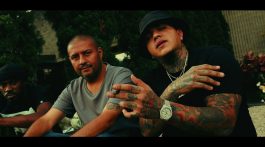

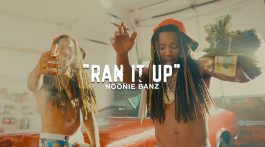
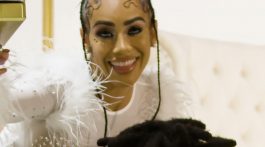

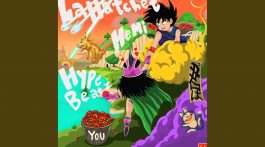
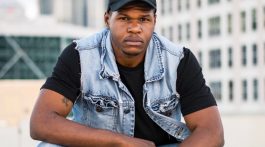

No Comment